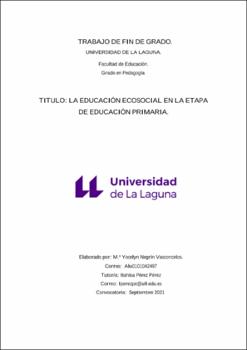La educación ecosocial en la etapa de Educación Primaria.
Fecha
2021Resumen
El abismo que existe entre la Educación por la Tierra y el punto en el que se encuentran
hoy las escuelas es casi tan grande como el abismo existente entre las políticas
climáticas actuales y lo mucho que nos reclama la ciencia para lograr un futuro mejor y
sostenible. Actualmente, habitamos en unas sociedades donde a la sostenibilidad no se
le concede apenas atención, es un tema el cual está ‘’excluído’’, y ni siquiera se habla
de él, pero lo principal es ver si existe alguna posibilidad de que se llegue a lograr un
sistema educativo verdaderamente centrado en la Tierra.
Se podría desempeñar un papel importante animando a las escuelas hacia el modelo de
Educación por la Tierra, un modelo educativo más sostenible, en el que todos y todas
puedan estar involucrados, aunque parece que las fundaciones actualmente se centran
más en las reformas educativas a corto plazo que mejoren el rendimiento académico
convencional, dejando de lado una parte fundamental de aprendizaje educativo para el
alumnado. Sin embargo, incluso si sus esfuerzos tienen éxito, de no integrarse estas
reformas en una ‘’teoría del cambio’’ centrada en la Tierra, los estudiantes seguirán
estando mal preparados para los tiempos difíciles futuros.
Es por ello, que es fundamental modificar las políticas gubernamentales para que estas
puedan orientar mejor a las escuelas hacia la sostenibilidad, ya que de ahí proceden la
mayor parte de la financiación y las directrices de las políticas educativas. Aunque
bastantes gobiernos han hecho varios esfuerzos por incorporar a sus currículos
nacionales la educación para el desarrollo sostenible (EDS), muy pocos han logrado
integrar profundamente la sostenibilidad en la medida necesaria para afrontar los
desafíos que nos deparan. Es obvio que la educación de su propia mano no salvará a la
humanidad, pero puede jugar un papel muy importante en esta sociedad para que así las
personas superen los tiempos que se avecinan sin que ello afecte a la humanidad.
También, la educación puede ayudar a formar a una nueva etapa, una nueva generación
de líderes capaces de ralentizar la crisis ecológica existente hasta una velocidad a la que
la humanidad pueda adaptarse. Que la educación desempeñe este papel requerirá sin
embargo, un liderazgo decidido de educadores, administradores y de los responsables
políticos que los apoyan. Si son capaces de reunir este liderazgo, quizás los estudiantes
3
futuros no sólo estarán más preparados para sobrevivir a los desafíos venideros, sino
que se habrán adentrado en la senda hacia un futuro sostenible, y eso es lo más
importante. The gulf that exists between Education for the Earth and the point where schools are
today is almost as big as the gulf between current climate policies and how much
science demands of us to achieve a better and sustainable future.
Currently, we live in societies where sustainability is hardly given attention, it is an
issue which is "excluded", and it is not even talked about, but the main thing is to see if
there is any possibility of achieving a truly Earth-centered educational system.
An important role could be played in encouraging schools towards the Education for the
Earth model, a more sustainable educational model, in which everyone can be involved,
although it seems that foundations are currently focusing more on short-term
educational reforms that improve conventional academic performance, leaving aside a
fundamental part of educational learning for students.
However, even if their efforts are successful, if these reforms are not integrated into an
Earth-centric "theory of change," students will still be ill-prepared for the difficult times
ahead.
That is why it is essential to modify government policies so that they can better guide
schools towards sustainability, since that is where most of the funding and guidelines of
educational policies come from. Although many governments have made various efforts
to incorporate education for sustainable development (SD) into their national curricula,
very few have managed to deeply integrate sustainability to the extent necessary to meet
the challenges ahead. It is obvious that education from one's own hand will not save
humanity, but it can play a very important role in this society so that people can
overcome the times ahead without affecting humanity.
Also, education can help shape a new stage, a new generation of leaders capable of
4
slowing down the existing ecological crisis to a speed at which humanity can adapt. For
education to play this role, however, will require determined leadership from educators,
administrators and the policy makers who support them. If they are able to muster this
leadership, perhaps future students will not only be better prepared to survive the
challenges ahead, but they will have embarked on the path to a sustainable future, and
that is the most important thing.





